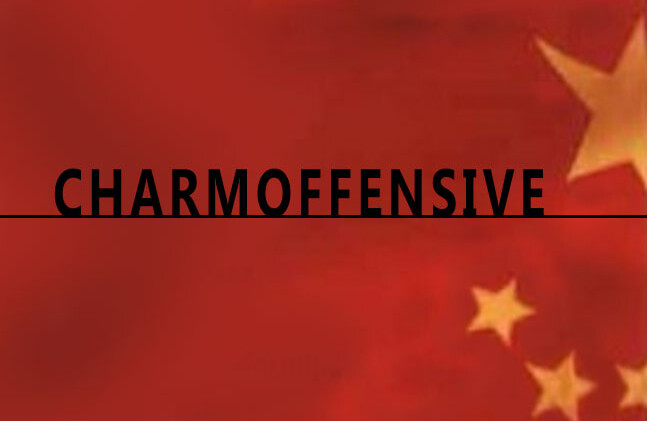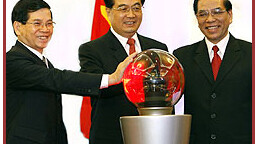Soft power, a phrase coined by Harvard professor Joseph Nye, expresses a country's ability to persuade others to do what it wants by attraction or example. But as Kurlantzick points out, "For the Chinese, soft power means anything outside of the military and security realm, including not only popular culture and public diplomacy but also more coercive economic and diplomatic levers like aid and investment and participation in multilateral organizations" (p. 6).
Whatever they are called, these methods are not new. Long before Nye invented the term, the United States and the former Soviet Union employed economic and diplomatic levers to win friends during the Cold War. Today in its turn, China is successfully using this broadened version of soft power to offer its own road to development as an alternative to U.S.-styled capitalism and democratic governance. The China development model promotes greater state-control of the economy, a renewed tolerance of authoritarianism, and a no-preconditions policy to conducting diplomacy, investment, and aid. Such alternatives challenge the existing international order and pose important ethical questions.
This adjustment in Chinese foreign policy began with changes on the home front, according to Kurlantzick. Deng Xiaoping, who held power from the late 1970s to the early 1990s, altered Chinese diplomacy by cutting support to revolutionary movements abroad—which had complicated its relations with a generation of policymakers in developing countries—and acting as a humble student before leaders of small and large countries, especially Asian countries. Such pragmatism and acts of humility allowed China to keep a low profile during most of the last quarter of the 20th century and permitted its leadership to focus on domestic politics and strengthening its socialist market economy.
But it was the aftermath of the crackdown at Tiananmen Square in 1989 that oddly solidified China's emergence as a potential global power. As Kurlantzick writes, "Memories of the event were buried under the avalanche of nationalism and growing pragmatism by the Chinese population, which essentially seemed to accept their authoritarian government." As a result, "both the Chinese public and the Chinese leadership gained vital confidence—confidence that China had a right to become a global power" (p. 19). Co-opting the professional classes and intelligentsia, replacing communist ideology with an updated nationalism, and exploiting the benefits of unimaginable rates of economic growth, provided China with a new model of development that attracted the interest of many developing world leaders.
Kurlantzick marks 1997 as a turning point in Chinese foreign policy. That year Thailand was hit with a financial crisis as it was forced to devalue its currency and experienced a run on its banks. The Clinton Administration hesitated to bailout the Thai economy despite recommendations from its Southeast Asian experts on the National Security Council. In the meantime, Thai businesses went bankrupt, unemployment jumped, and the mood toward the United States became embittered, according to Kurlantzick, who reported the crisis from Bangkok.
The Chinese, however, quickly made a symbolic move during the crisis by publicly announcing it would not devalue its own currency—doing so would have forced further devaluations across Asia and created more problems for Thailand. Although the United States, Japan, and the International Monetary Fund eventually came in to help, many Thais only remember China's initial gesture.
Since then, China has taken advantage of its soft power capabilities to become a leader for the developing world. It has strengthened its attraction through the expansion of cultural centers, student-scholar exchanges, development aid, state-directed foreign investment, and its influence at multilateral organizations. These initiatives are helping China achieve its goals of "maintaining peace and stability on its borders, portraying itself to other nations as a benign and constructive actor, possibly becoming a model of development to other nations, obtaining resources needed to power the Chinese economy, isolating Taiwan, and demonstrating the possibility that it can eventually become a great power" (p. 130).
By way of attentive diplomats that spend entire careers in a particular country and through special treatment from Chinese leaders to representatives from developing countries generally ignored by the United States, China has achieved numerous converts. This progress has come about despite the fact that "China's exports overlap by more than 50 percent with those of countries like Thailand and the Philippines, (and) foreign investment in developing regions like Latin America that compete with China fell by half in the early 2000s, and nations like Laos import eight times as much as they export to China" (p. 161).
Kurlantzick also documents how the United States indirectly allowed China to win this considerable influence. During the Clinton Administration, U.S. foreign affairs programs were cut from more than $5 billion in 1994 to $3.64 billion in 2000, with significant cuts to public diplomacy. This trend was reversed after September 11th, but the Bush Administration has offset increased funding by compromising Washington's commitment to multilateralism and for its preference for hard power tactics. The aftermath of Hurricane Katrina also demonstrated to the world that poverty, inequality, and racism are problems that also plague democratic countries.
Kurlantzick also identifies the potential consequences of China's use of soft power. First, China's values appeal mainly to elites in authoritarian nations. Sooner or later such elites may be replaced by another regime that will resent China's dealings with former strongmen. In addition, many countries, especially those in Latin America, risk being "trapped in a cycle of mercantilism, in which they sell natural resources to China and buy higher-value manufactured Chinese goods" (p. 231). There is also the likelihood that China will take all necessary measures to protect the natural resources it has retained in other regions, including establishing a military presence.
Charm Offensive serves as a lesson for U.S. policymakers given chapters dedicated to errors committed by recent administrations and how they can be rectified. Hence, the author sees a need for the United States to counter China's soft power. But Kurlantzick avoids making any ethical judgment on the questionable elements of Chinese soft power, specifically China's diplomatic and business relationships with authoritarian regimes and human rights violators, like Sudan. Nor does he pass judgment on the potential effects the promotion of the China development model may have on democratization efforts.
Through unconditionally negotiating policy and investment deals with authoritarian or semi-authoritarian governments (e.g., Iran, Venezuela, Zimbabwe), China legitimizes and reinforces such regimes. China experts often give the example of blossoming religious and environmental civil society organizations as evidence of China's potential future as a democracy, but many fail to recognize democratic expansion as a process by which potentially democratizing countries are influenced by other democratic movements within their regions or throughout history.
The China development model may act as an amoral barrier to democratization efforts and threaten the idea of democracy as a universal value. It may be that Kurlantzick's background as a journalist limits him to reporting the facts and possible consequences. But it is important to point out that silence on ethical questions have become more problematic as the war in Iraq and other unsuccessful Bush Administration initiatives have blurred what were once considered moral imperatives.
Nevertheless, Charm Offensive is an essential work. When U.S. foreign policy leaders finally look beyond Iraq and begin to catch-up on China's growing influence, Kurlantzick's book will be at the top their reading lists.


